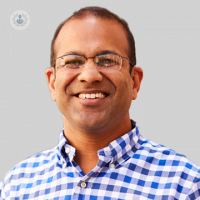Gallstones: what happens when they cause pain and discomfort
Written by:Gallstones in many instances do not produce any symptoms, however, if they become trapped they can produce abdominal pain which can require treatment and intervention. Expert surgeon, Professor Hemant Kocher explains when gallstones become a problem and how they can be treated.

Are gallstones dangerous?
Most gallstones are not dangerous, but gallstones can become dangerous. Gallstones can pose a danger if they block the gallbladder and the flow of bile through it. In this instance, you can get an infection within the gallbladder. This is what is known as cholecystitis which can be acute or chronic (long-standing).
When gallstones leave the gallbladder they usually go via the bile duct. If gallstones get stuck in the bile, this can lead to jaundice. Jaundice means yellowing of the eyes and producing dark, yellow urine. Gallstones can also irritate the pancreas and cause pancreatitis. Both pancreatitis and jaundice can be serious, life-threatening illnesses.
In rare instances, gallstones can go into the bowel and cause blockages, meaning food cannot pass through. When this happens, patients would present with abdominal pain and vomiting which can also be a serious condition. How gallstones should be treated has to be decided with your specialist who will take into account your symptoms, scan results and blood test results.
Where do gallstones hurt?
The pain from gallstones usually presents in the upper part of the tummy, close to the breastbone or just below the right ribcage. The pain is usually spasmodic or colicky which means it comes and goes in waves. Gallstone pain can sometimes move to the back towards the right shoulder blade too. Pain may be associated with vomiting or intolerance to fatty food. Gallstone pain can be avoided by avoiding fatty food such as fried food, butter, cheese and dairy products with a high fat content.
When is surgery needed?
Surgery is required for some conditions where gallstones are causing problems. Surgery is most commonly required to prevent future problems which the gallstones may cause. Surgery may also be required when the patient gets symptoms from gallstones such as pain, vomiting, or intolerance to fatty food. Gallstone surgery can also be carried out when gallstones cause complications such as pancreatitis or obstructive jaundice.
Gallstones are not removed on their own but are removed along with the gallbladder. If one does not remove the gallbladder, gallstones are likely to form again as the gallbladder is unable to expel all the thick bile. Therefore, gallstone surgery is accompanied by removing of the gallbladder.
Gallstone surgery is commonly performed laparoscopically (keyhole surgery) which means small incisions are made on the abdomen or tummy. This is called a laparoscopic cholecystectomy. Laparoscopy cholecystectomy is usually done as a day-case procedure. You may be required to stay in longer than a day depending on your physical condition, other health problems as well as if any complications are present from the gallstones.
For more information about gallstones, or to book an appointment with a specialist make an appointment here.


